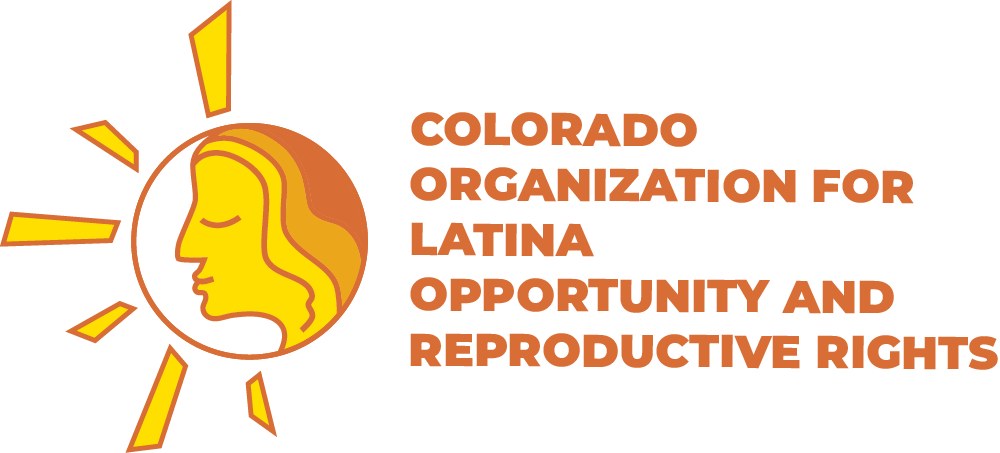PARA PUBLICACIÓN INMEDIATA –
23 de marzo de 2022
Contactos de prensa:
Aurea Bolaños Perea,
Gerente de Comunicaciones Estratégicas, COLOR
aurea@colorlatina.org
Laura K. Chapin
Consultor de comunicaciones, Cobalt
(303) 954-8416
Laura@cobaltadvocates.org
LA LEY DE EQUIDAD EN SALUD REPRODUCTIVA SE APRUEBA EN EL SENADO DEL ESTADO DE COLORADO Y PASA AL ESCRITORIO DEL GOBERNADOR POLIS
DENVER, CO – HB22-1279, también conocida como Ley de Equidad en Salud Reproductiva (ÑANDÚ)La ley RHEA, que busca incluir en la legislación de Colorado las protecciones para el acceso al aborto, fue aprobada en el Senado estatal de Colorado con una votación de 20 a 15. La RHEA ya fue aprobada en la Cámara de Representantes de Colorado el 14 de marzo, por lo que hoy es el último paso legislativo del proceso. El proyecto de ley ahora pasa al escritorio del gobernador Polis para su firma. La RHEA está patrocinada por la líder de la mayoría de la Cámara de Representantes, Daneya Esgar (demócrata por Pueblo), la representante Meg Froelich (demócrata por Littleton) y la senadora Julie Gonzales (demócrata por Denver).
La Ley de Equidad en Salud Reproductiva garantizará que cada individuo tenga el derecho fundamental de elegir o rechazar la anticoncepción; cada individuo que quede embarazada tiene el derecho fundamental de elegir continuar un embarazo y dar a luz o tener un aborto; y un óvulo fertilizado, embrión o feto no tiene derechos independientes bajo las leyes de Colorado.
“La senadora Julie Gonzales ha sido una defensora absoluta de la RHEA, y estamos profundamente agradecidos por su trabajo, así como por las muchas horas y noches de trabajo de nuestros patrocinadores en la Cámara de Representantes. La aprobación de la Ley de Equidad en la Salud Reproductiva es un paso histórico y proactivo para proteger la capacidad de todos los habitantes de Colorado de acceder a la atención médica reproductiva que necesitan y merecen, independientemente de su raza, orientación sexual, identidad de género, estado migratorio, afiliación religiosa o ingresos”. dijo Dusti Gurule, presidenta de la Organización de Colorado para las Oportunidades y los Derechos Reproductivos de las Latinas (COLOR).
Y según La presidenta de Cobalt, Karen Middleton, “Mientras el acceso al aborto pende de un hilo en la Corte Suprema, la RHEA garantiza que estos derechos fundamentales estén protegidos en la ley estatal de Colorado. La RHEA debería servir de estímulo a los responsables de las políticas y a los defensores de los derechos de las mujeres en otros estados para que sepan que es posible proteger con valentía los derechos al aborto y que es lo correcto.
Queremos agradecer a nuestros patrocinadores en la Cámara de Representantes y el Senado, el Senador Gonzales, el Líder de la Mayoría de la Cámara de Representantes Esgar y el Representante Froelich, por patrocinar y defender la RHEA. También agradecemos profundamente a todos nuestros aliados que testificaron y contaron sus propias historias personales sobre lo que esta legislación significa para ellos y sus electores. La RHEA convierte en ley nuestros valores de larga data de Colorado y garantiza que el aborto no solo sea legal sino también accesible en Colorado para cualquier persona que lo desee, sin estigma, barreras de costo o interferencia política”.
Si bien Colorado ha derrotado con éxito 44 intentos de prohibir o restringir el aborto en la Asamblea General desde 2010 y 4 intentos en las urnas desde 2008, no hay nada que proteja explícitamente el acceso al aborto en la ley de Colorado. Hasta ahora, los habitantes de Colorado han confiado en la protección constitucional del aborto. Hueva y los tribunales federales. Esta protección podría no existir por mucho más tiempo, por lo que necesitamos aprobar la RHEA ahora. La Corte Suprema está lista para revocar Hueva Esta primavera con su fallo en Dobbs contra la Organización de Salud de la Mujer de Jackson, un caso que desafía la prohibición inconstitucional del aborto en Mississippi.
“Sabemos que hay un apoyo rotundo a RHEA en Colorado y en todo el país”, concluyó. Dusti Gurule, presidenta de la Organización de Colorado para las Oportunidades y los Derechos Reproductivos de las Latinas (COLOR). “Más de 55 organizaciones en todo el estado y el país, y más de 800 personas que han firmado nuestra petición, creen en el trabajo de RHEA, y sabemos que nuestra comunidad también lo hace. Esperamos asegurarnos de que Colorado siga siendo un estado que se preocupa por todos sus residentes y sus necesidades de salud reproductiva”.
###

